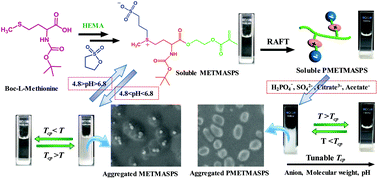A stimuli-responsive methionine-based zwitterionic methacryloyl sulfonium sulfonate monomer and the corresponding antifouling polymer with tunable thermosensitivity†
Abstract
This report describes the design and synthesis of a zwitterionic [Boc-L-methionine-(2-methacryloylethyl)]sulfoniopropanesulfonate (METMASPS) monomer derived from methionine followed by its subsequent RAFT polymerization in water to produce a zwitterionic polymer (PMETMASPS). The aqueous METMASPS monomer solution exhibits transparent to turbid and turbid to transparent transitions near to its isoelectric point (5.75) upon switching the pH from anything below 4.8 to 4.8–6.8 and from 4.8–6.8 to above 6.8. Furthermore, in the pH range of 4.8–6.8, this turbid suspension transforms into a transparent solution showing a clear upper critical solution temperature (UCST)-type phase transition. However, the zwitterionic polymer is soluble in water at any pH value ranging from 1 to 12, but its transparent aqueous solution turns into a turbid solution exhibiting a soluble–insoluble phase transition upon addition of different kosmotropic anions such as SO42−, Ct3−, H2PO4− and Ac− of the Hofmeister series. This colloidal turbid suspension containing anion becomes transparent showing a distinct UCST-type phase transition upon heating. The cloud point (Tcp) is tunable with respect to the molecular weight of the polymer and the concentration of ions as well as solution pH. Finally, the antifouling property of the as-synthesized zwitterionic PMETMASPS is studied against resistance towards a model protein, bovine serum albumin (BSA) through the monitoring of anti-aggregating behaviour via DLS and is compared with that of poly(ethylene glycol) (PEG).



 Please wait while we load your content...
Please wait while we load your content...